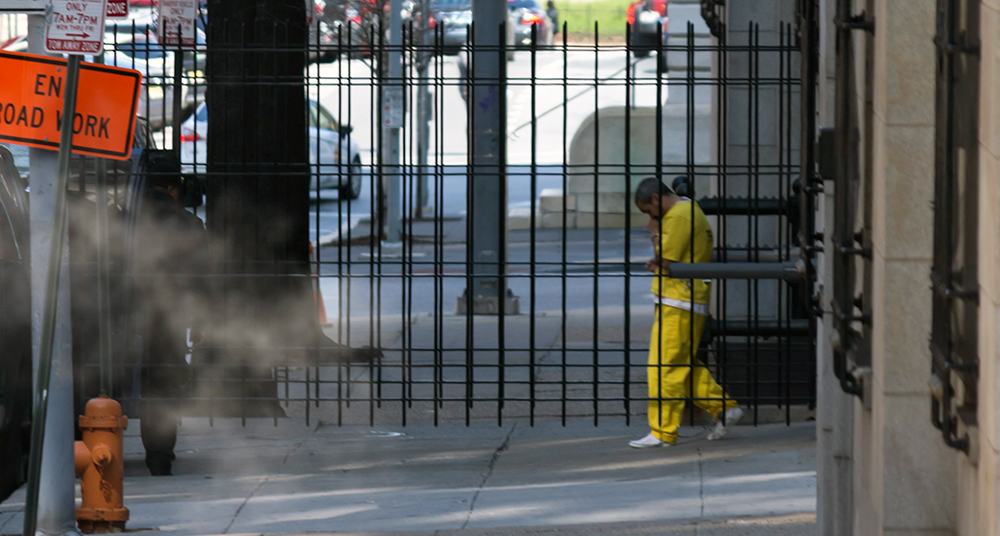By JACK HOGAN
COLLEGE PARK, Md. — Maryland inmates make as little as $0.17 per hour for voluntary prison employment and training, a stipend that one lawmaker compared to “slave labor” in support of legislation that would require the state to pay more.
Del. Terri Hill, D–Baltimore, and Howard, wants to raise the stipend for all inmate work volunteers to as close to minimum wage as possible, helping them save money while incarcerated and equipping them to re-enter society without having to rely on their families –– or further criminal activity that could again land them behind bars –– for financial support.
“This bill attempts to allow Maryland to leave the vestiges of slavery and peonage behind,” Hill said in an online House Judiciary Committee hearing Jan. 26 that Capital News Service viewed.
Sen. Joanne Benson, D–Prince George’s, presented the bill, SB0194, to the Senate Finance committee Thursday afternoon.
In 2020, inmates that Maryland Correctional Enterprises employed at a prison or at a warehouse location didn’t make more than $1.16 hourly, absent a $0.01 raise or longevity pay, though inmates trusted to leave their prison complex for work release made minimum wage, according to the program’s most recent annual report.
In prison, inmates must purchase stamps, toiletries, and phone minutes by their own means, Kimberly Haven, who worked for Maryland Correctional Enterprises during her own incarceration, said in her Jan. 26 testimony in support of raising inmate wages.
If inmates cannot rely on their wages to purchase these items, they may turn to outside support from family or to “side hustles,” which Haven explained are like a barter system of items like cigarettes that “inevitably” result in criminal activity within correctional facilities.
Haven said that during her incarceration, inmates had to choose from a handful of rehabilitative programs, including school, working the prison grounds, and working for Maryland Correctional Enterprises –– the most widely favored.
“There is no just ‘pressing your bunk’ and doing your time,” Haven said.
Boosting prison pay to the prevailing Maryland minimum wage –– which by 2025 will reach $15 per hour for employers with 15 or more workers –– would cost the state more than $18 million in 2022.
Chief Administrative Officer Mark Rowley said in his Jan. 26 testimony that the added expenditure would bankrupt Maryland Correctional Enterprises, which pays for materials inmates use, employs civilians who work in the program and covers other manufacturing expenses.
He told Capital News Service that Maryland Correctional Enterprises has been “mischaracterized as an employer,” adding that the program’s focus has been on outcome, or rehabilitation, not income.
Inmates who volunteer work four- to five-day weeks in furniture restoration, printing, textiles, meat production, laundry services or making license plates, according to the program’s annual report, with products going to various state institutions, including the University System of Maryland’s campuses.
Inmates are entitled to four months off their sentence for each year they work for Maryland Correctional Enterprises, Rowley said.
The program pays the prevailing wage to a handful of inmates working in Prison Industry Enhancement, or PIE, through which the program contracts to private industries.
Of the 821 inmates Maryland Correctional Enterprises employed across 10 state facilities in 2020 –– a pandemic-induced decline from 1,516 in 2019, according to the program’s annual report –– just eight worked in the PIE program.
In 2020, the PIE program generated a total of at least $29,823, nearly 30% of which went toward the inmates’ room and board, according to the report.
Hill’s bill, HB0102, would prohibit the Department of Public Safety and Correctional Services from deducting room and board costs from all inmates’ wages, but it would still require inmates to pay court expenses, child support, restitution, and any other crime- or family-related costs before being able to save.
Stephen Sanders, chief executive officer for Maryland Correctional Enterprises, said in his testimony at the Jan. 26 Judiciary Committee hearing that his organization believes “current rates of pay are appropriate and allow MCE to remain effective and efficient.”



Recent Comments